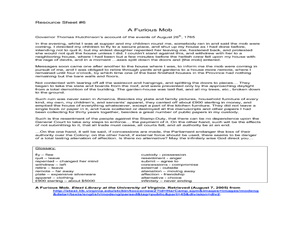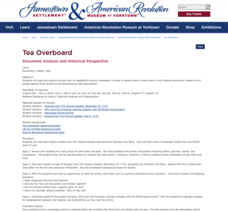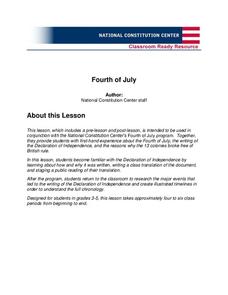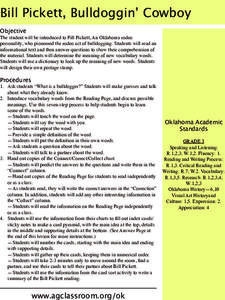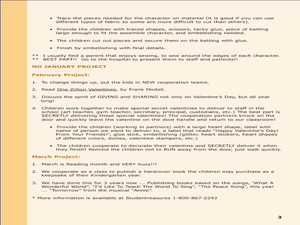Curated OER
Not Getting the News about the Stamp Act
How did American colonists react to the Stamp Act of 1765? Your young historians will examine primary source material by reading excerpts from a transcription of the Pennsylvania Gazette and then identifying the sentiments expressed...
Curated OER
Why were the colonists upset about the Stamp Act?
Fifth graders read documents to address why colonists were upset about the Stamp Act. For this sourcing and contextualization lesson, 5th graders read a variety of documents from the American Revolution and predict the author's...
Curated OER
Reading Comprehension 1: Level 12
Need to assess the reading comprehension level of your class or of a new student? The subject matter of the reading passage, euthanasia, is sure to engage your readers’ interest while the questions test a variety of comprehension...
Curated OER
Causes of the American Revolution
Challenge your fifth graders with this lesson. They read about the American Revolution, discuss key terms, and engage in a variety of activities. First, they create a timeline, then they answer an online quiz, and finish by making a...
Curated OER
Consequences of Individual Choices
Students take the sides of Patriots or Tories. In this colonial American instructional activity, students read primary sources that feature James Murray and Captain Jones. Students then write dialogues and limericks based on a fictional...
Curated OER
George Grenville’s Speech in the House of Commons,January 14, 1766
In this Stamp Act worksheet, young scholars read and discuss an excerpt of the speech delivered by George Grenville to the House of Commons in defense of the act.
Curated OER
A Furious Mob
In this Stamp Act worksheet, students read and discuss an excerpt titled "A Furious Mob," which was written by Governor Thomas Hutchinson regarding the events of August 26, 1765.
Jamestown-Yorktown Foundation
Tea Overboard
While less well known than the event in Boston, the Yorktown Tea Party was equally decisive in turning community sentiment against Great Britain. To gain an understanding of why the colonists objected to the Tea Act, young historians...
National Constitution Center
Fourth of July (Grades 3-5)
Bring history to life for your young scholars with a Fourth of July lesson series. After a class reading of the Declaration of Independence, students translate this pivotal document into layman's terms before working in small...
Curated OER
The American Revolution
In this American Revolution activity, students read and discuss a 2 page article on The American Revolution, answer 2 statements with multiple choice answers and fill in 6 blanks to complete 6 facts referring to The American Revolution.
Curated OER
Revolutionary War, Timeline and Causes
Third graders explore important events leading up to the Revolutionary War. In this Revolutionary War lesson, 3rd graders work in pairs to research dates and important events prior to the Revolutionary War. Class discussion is followed...
Curated OER
The American Revolution
Eleventh graders read and analyze document based questions about the American Revolution. In this American History lesson, 11th graders analyze documents and pictures.
Los Angeles Unified School District
Why Is the Declaration of Independence Important?
Fair or unfair? To begin a study of the American Revolution, class members review the treatment of the people of the American Colonies by the King of England and decide which were fair and which were unfair. Class members then annotate a...
Curated OER
Bill Pickett, Bulldoggin' Cowboy
Who was Bill Picket? Interested readers work through an informational passage to find out about a famous "bulldogger" from the old West. They answer several reading comprehension questions and use a seven step process to decode new...
Curated OER
Revolt in Boston
Eleventh graders study the American Revolution. For this American History lesson, 11th graders analyze primary sources. Students participate in a simulation on taxes.
Curated OER
Surrender at Yorktown
Eighth graders examine the start of the American Revolution. In this American History lesson, 8th graders analyze primary sources. Students prepare a narration of events leading up to the revolution.
Curated OER
Lesson 2: How Taxes Evolve
Twelfth graders examine the legislative process of enacting federal income tax laws. They conduct research and report on the Federal Migratory Waterfowl Stamp (Duck Stamp) Act of 1934.
Curated OER
Can't You Make Them Behave, King George?
Fifth graders describe the changes in King George III's policy toward the American colonies by sequencing key events between the French and Indian War and the American Revolution. They explain the colonial reactions to command decisions...
Curated OER
Mail Call!
Students explore the National Postal Museum through an interactive program. They explore how a stamp design gets proposed and who designs them. They also examine the history of the postal service.
Curated OER
The Shot Heard Around the World
Fifth graders examine the events leading up to the beginning of the Revolutionary War. In groups, they put the events into chronological order and create a timeline. As a class, they discuss the reprecussions of the Stamp Act,...
Curated OER
Cooperative Learning Projects
Students practice cooperation skills. In this cooperative learning instructional activity, students read 6 books regarding cooperation and then participate in 6 cooperative activities.
Digital History
The Boston Massacre
What better way to get your class interested in history than to embody important historical characters and make events come to life? Stage a realistic mock trial of the British soldiers accused of murdering five Bostonians after the...
Curated OER
The Gerund Phrase
Do your young grammarians need extra practice identifying gerund phrases? After reading a short definition and studying examples, learners underline the gerund phrases in 20 sentences. This worksheet could be used as the basis of a...
Curated OER
The Liberty Bell
In this Liberty Bell worksheet, students read for information and comprehension. In this short answer worksheet, students answer ten questions.








